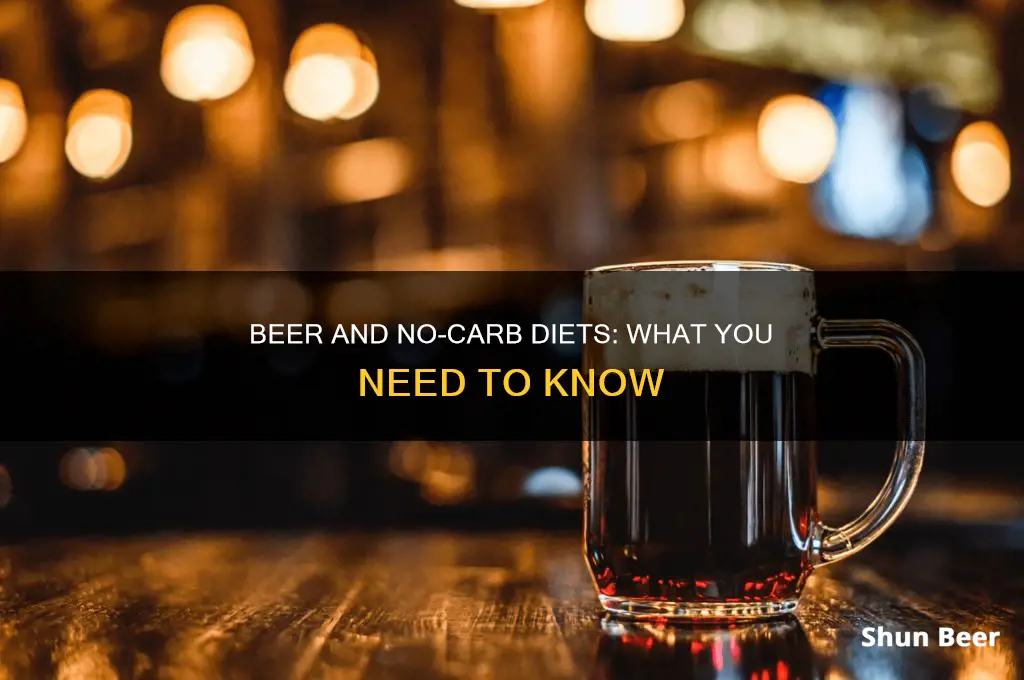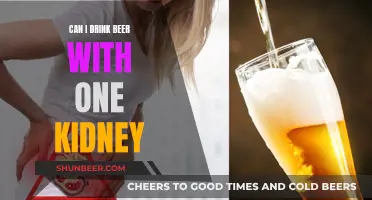
Beer is typically high in carbohydrates, with starch being one of its primary ingredients. A 12-ounce serving of beer usually contains 3-12 grams of carbs, depending on whether it is a light or regular variety. For this reason, most beers are not recommended for those on a keto diet, as the high carb content can hinder weight loss efforts by blocking fat burning and causing excess body fat. However, there are some low-carb beer options available, typically containing fewer than 5 grams of carbs per serving. These include Budweiser Select 55, Corona Premier, Dogfish Head Slightly Mighty, and Lagunitas DayTime, among others. While these low-carb beers can be incorporated into a keto diet in moderation, it is important to remember that alcohol can affect judgment and willpower, potentially leading to decisions that contradict one's diet plan.
What You'll Learn

Beer is high in carbohydrates
The amount of carbs in beer varies depending on the type and brand. For example, a light lager typically has 5.9 grams of carbs per 12-fluid-ounce bottle, while a Guinness stout has 9.9 grams of carbs per 11.16-fluid-ounce bottle. Some ""light"" beers have fewer carbs, but this can also mean low calorie or low alcohol, so it's important to check the label.
Regular lagers typically vary in carbohydrate content from about 10 to 15 grams per pint, while some 'light' beers may have less than 10 grams of carbs per pint, and some less than 5 grams. Stouts, Porters, and Guinness tend to be on the higher end of the carbohydrate spectrum among beers and can have upwards of 20 grams of carbohydrates per pint.
If you are on a low-carb diet, it is important to be mindful of your beer consumption. However, this does not mean that you have to completely avoid beer. There are several low-carb beer options available, such as Corona Premier, Kona Light Blonde Ale, and Budweiser Select 55, which have around 5 grams or less of carbs per serving. Additionally, Miller Lite has only 3.2 grams of carbs per 12-ounce bottle.
The Magic Behind Beer Canning: A Step-by-Step Guide
You may want to see also

Alcohol is calorie-dense
The number of calories in a drink is primarily determined by its alcohol content, rather than the amount of sugar added. This is because alcohol is more calorie-dense than carbohydrates. For example, a standard glass of wine can contain up to 158 calories, and some pints of stronger lager can contain up to 222 calories.
Additionally, alcohol is a source of "empty calories", meaning it is calorie-dense but does not provide other nutrients. This can potentially contribute to nutritional deficiencies and may lead to weight gain over time. Alcohol can also slow down fat burning by hindering weight loss. When you drink alcohol, your body metabolises it before other nutrients to use it as fuel. This can cause extra carbs, protein, and fat in your diet to be stored as fat tissue, resulting in excess body fat.
Excessive alcohol intake has consistently been tied to weight gain in observational studies. Therefore, it is essential to drink alcohol in moderation, which is defined as one drink per day for women and two drinks per day for men.
A Beer Lover's Guide to Mohegan Sun Fest
You may want to see also

Alcohol can slow down fat burning
Alcohol can indeed slow down fat burning. When you drink alcohol, your body metabolizes it before other nutrients to use it as fuel. This is because the body considers alcohol a toxin or waste product, and it will shut down all other metabolic pathways until the alcohol is out of your system. This can slow down fat burning and cause extra carbs, protein and fat in your diet to be stored as fat tissue, resulting in excess body fat.
Heavy alcohol consumption can also decrease fat breakdown and increase fatty acid synthesis, leading to the accumulation of triglycerides in your liver. Over time, this causes a condition called fatty liver disease.
The process of metabolizing alcohol can take the body up to 36 hours. During this time, the body will be unable to burn fat. The more ethanol that is present, the more time it will take for the body to return to burning fat.
Drinking alcohol can also lead to increased cravings for food, especially low-fibre starches and salty foods like french fries. This is because drinking alcohol, which is high in sugar, causes the body's blood sugar levels to drop, a condition called reactive hypoglycemia. As part of the body's effort to rebalance blood sugar, appetite increases. The more food consumed, especially food with limited nutritional value, the more calories there are for the body to work through before getting back to fat burning.
Neoprene Beer Coolers: How Do They Work?
You may want to see also

Alcoholic drinks with low carbs
It is possible to drink alcohol on a low-carb diet, but it is important to be mindful of the carbohydrate content of different drinks. Many types of alcohol are high in carbohydrates, with beer and mixed drinks being especially rich in carbs. However, there are some alcoholic drinks that are low in carbs or even carb-free.
Pure Forms of Alcohol
Pure forms of alcohol such as rum, whiskey, gin, tequila, and vodka are completely free of carbs. These can be consumed straight or mixed with low-carb ingredients.
Wine
Wine is also a relatively low-carb option, usually containing 3-5 grams of carbs per serving. Dry wines tend to have fewer carbs than sweeter varieties.
Light Beer
Light beers are another good choice for those watching their carb intake. They typically have less than 1 gram of carbs per 100 milliliters, but it's important to check the nutritional information as carb content can vary.
Low-Carb Cocktails
When it comes to cocktails, it's best to opt for ultra-dry, simple drinks such as a vodka soda, gin rickey, or dry martini. Classic cocktails often contain high amounts of carbohydrates due to sugary mixers, but simple substitutions can be made to create low-carb versions. For example, a Manhattan can be made with dry vermouth instead of sweet vermouth, and an orange peel instead of a maraschino cherry.
Beer Ads: What Doesn't Work and Why
You may want to see also

Beer alternatives on a no-carb diet
Beer is typically high in carbohydrates, with a standard beer containing around 13 grams of carbs per serving. However, if you are on a no-carb diet, there are several low-carb beer alternatives to choose from. Here are some options:
- Budweiser Select 55: With only 1.9 grams of carbs per serving, this beer is a great low-carb option. It has a slightly lower alcohol content than the original Budweiser, but you won't have to compromise on flavour as it has notes of toasted malt and hops.
- Corona Premier: This beer has 2.6 grams of carbs per 12-ounce bottle, which is less than the Corona Extra and Corona Light options. It is described as having a sweet, crisp, and even-bodied flavour with fruity notes and hints of honey and malt.
- Miller Lite: This classic light beer has only 3.2 grams of carbs per 12-ounce bottle and maintains a standard ABV of 4.2%. It is advertised as "the original light beer" and aims to deliver great taste while being less filling.
- Beck's Premier Light: With just 3.9 grams of carbs and a low ABV of 2.3%, Beck's Premier Light is a good option if you're looking for moderation in both carbohydrates and alcohol content. It is described as a refreshing beer, ideal for summertime sipping.
- Michelob Ultra Pure Gold: This is the first USDA-certified organic beer in the United States. It has a crisp and fresh taste with zero artificial flavours or colours. Each 12-ounce bottle contains just 2.5 grams of carbs.
- Amstel Light: While this beer has a slightly higher carb count of 5 grams per 12-ounce bottle, it makes up for it in flavour. It has a slightly bitter taste and a strong hoppiness that sets it apart from other light beers.
- Yuengling Flight: This lager-style beer has less than 3 grams of carbs per 12-ounce serving. It is a little fuller-bodied than some other light beers and has a smooth, balanced taste.
- Blue Moon LightSky: This wheat beer is brewed with tangerine peel, giving it a zesty and fruity flavour. It has 3.6 grams of carbs per 12-ounce serving and a moderate ABV of 4%.
- Shiner Ruby Redbird: This craft beer is made with Texas ruby red grapefruit and a kick of ginger. It has 4.6 grams of carbs per 12-ounce bottle and a refreshing, crisp taste.
- Surly Brewing Co. Rosé: This unique beer gets its pink colour from currants and strawberries used in the brewing process. It has a fruity and refreshing taste with only 2.25 grams of carbs per bottle and an ABV of 5.2%.
Beer Science: Brewing Chemistry and History Podcast
You may want to see also
Frequently asked questions
Beer typically contains a lot of carbs, so it's not recommended for a no-carb diet. However, if you're on a low-carb diet, you can opt for light beers or low-carb beers, which have fewer carbs per serving.
Some beers that are relatively low in carbs include:
- Budweiser Select 55
- Corona Premier
- Dogfish Head Slightly Mighty
- Lagunitas DayTime
- Michelob Ultra Pure Gold
- Miller Lite
- Yuengling Flight
- Beck's Premier Light
- Natural Light
- Devils Backbone Bright Tangerine Ale
- Shiner Ruby Redbird
- Surly Brewing Co. Rosé
- Bud Light Next
- Milwaukee's Best Light
- Yuengling Light Lager 99
- Allagash Saison
- Ommegang Brut IPA
- Kona Light Blonde Ale
- Deschutes Da Shootz! Pilsner
- Heineken Silver
- Omission Ultimate Light Golden Ale
- Keystone Light
The carb content varies, but generally, these beers have around 2 to 7 grams of carbs per serving.
Yes, pure spirits such as rum, whiskey, gin, and vodka are carb-free. However, be mindful of mixers, as they can add carbs and sugar to your drink.







